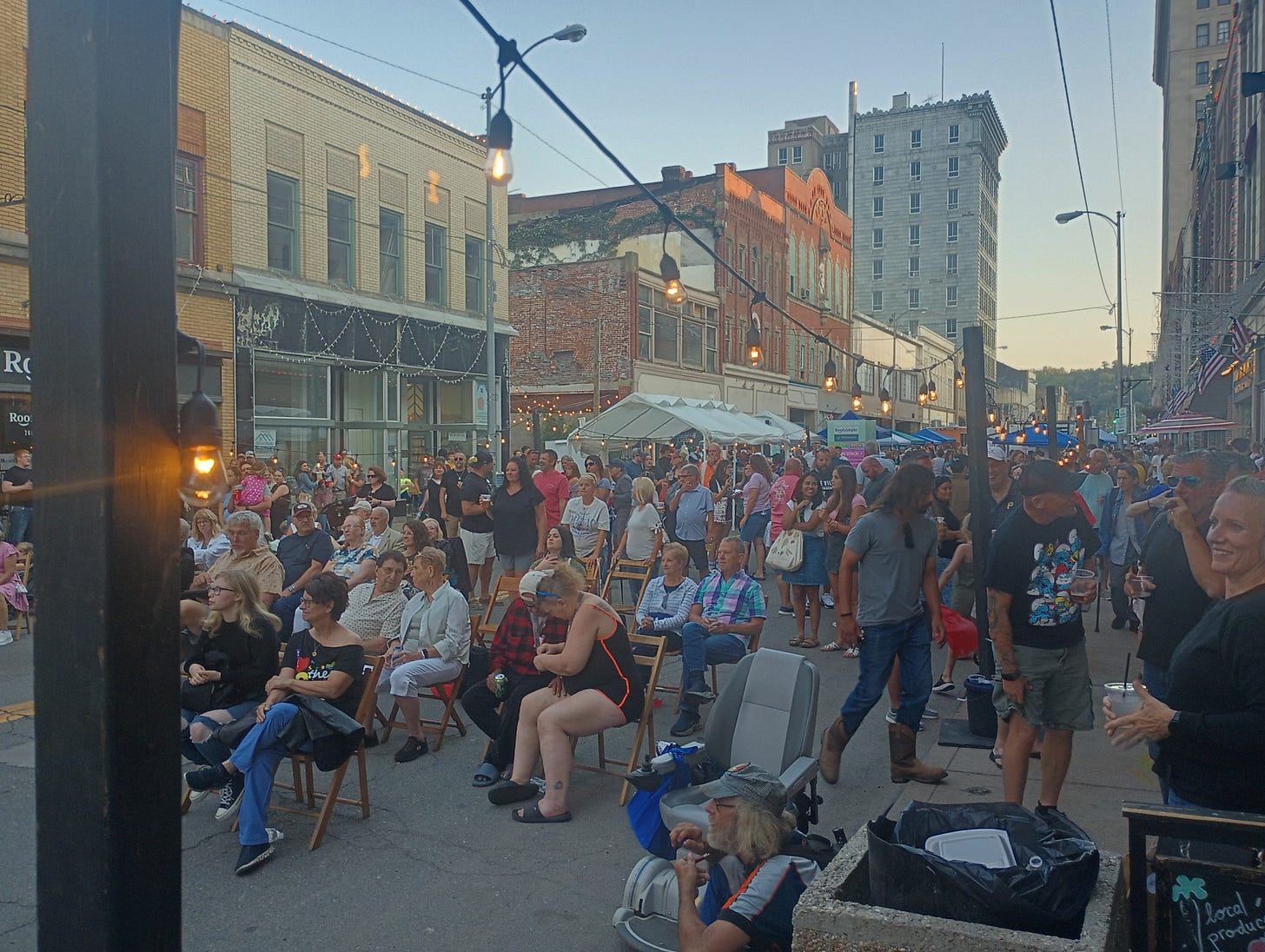Does Steubenville Have Enough to Survive?
Do we need big industry back?

I’ve heard people talk pessimistically about Steubenville because the steel mill is closed. The idea is, until we get something in its place, there’s no sense even trying to save the place: it just has to be left to die. I think this is part of a larger psychological problem created by big business – it creates dependency and passivity – but in this essay I want to take the idea seriously on its own terms without any look at what created the idea in people’s heads.
Steubenville has 18,000 people. What do we have here to support a town of 18,000 people?
Well, first of all we have the county government. The county office tower, the county courts, even the county prison is here, right downtown on the waterfront. If you look at the parking lots for all these places, they fill up every day with workers and visitors.
Many county seats in America don’t have very much more than the county government and all the restaurants and lawyers’ offices and dry cleaners and other service industries that go along with it.
But we have more. We have a hospital too. A pretty big one, Trinity Hospital. That’s a whole staff of professionals employed here. It brings in people from the whole region to work and receive care.
Many towns get by on just county government and the county’s only hospital.
But we have more. We also have Franciscan University, which brings in thousands of students every year. Not only that, Franciscan has a robust conference program, which brings in visitors from all over the country.
We really can stop there: it is definitely possible to create a nice town of 18,000 people when you have the county government, a hospital, and a university that is thriving and bringing in visitors all throughout the year.
But we have more. There is the St. Paul Center for Biblical Study, closely related to Franciscan but in fact separate, which has its own staff, its own conferences, and even its own publishing house, Emmaus Road Press. It has a big warehouse for its books on University Ave. There’s also the new College of St. Joseph the Worker. They have only sixty students now but they are hoping to grow to 300 students in time.
With these distinctive businesses come also the normal concerns of an American town: a supermarket, restaurants, banks, two libraries, two hardware stores, a Wal-mart, a pet store, a book store (which I’m rather fond of) and many others.
This is enough to have a nice town and support 18,000 people.
But we still have to be smart. There are two things we need.
First, we need to keep our own money here in Steubenville. The College of St. Joseph the Worker sends their book orders to me. Why? Because they want my business to succeed. I get my pizzelles from Federico’s for the same reason. I buy groceries from the Grocery Box. I stock books from Emmaus Road. I know that by doing so I’m supporting my own customers – the people who live here. I eat out downtown often, because I want to those businesses prosper. This is the root of the Dollar General argument. If there were a Dollar General here, they would probably pay $10,000 a year in real estate taxes to the city. And a few hundred thousand dollars a year in local wages. But in exchange for that the average Dollar General takes $2 million a year out of an area: none of its suppliers are local. And none of its profits stay local. We would pay $2 million for $200,000 in local benefit. It’s worth it if the service they provide is worth the $1.8 million annually. I think Chipotle offers something worth paying for, and my wife was at their opening. This is not just subjective whim: you find Chipotles in economically prosperous areas, and Dollar Generals in depressed areas. The general principle: we should spend our money to support all the activities we want to see more of here in Steubenville.
Second, we need an efficient government. The government remains the largest factor in the success of any region. Right now our government is working hard to bring in businesses that will not improve the area and using our money to destroy homes and buildings people can use. We cannot demolish our way to prosperity any more than we can Dollar General our way to prosperity.
But still, there is reason for hope. It’s entirely possible to shift our spending to support the businesses that are helping create the city we want to see. It’s possible to support institutions that are overtly working for the good of the city. There’s reason to believe that the people who run the city will respond to good ideas and good arguments.
Nevertheless, one big takeaway is this: it will require a lot of work. No Daddy Warbucks is going to come and save Steubenville and give everyone jobs. But it is entirely possible that we can plant trees, put in new parks, start new businesses, fix up old homes, and do the things that will make this place beautiful. It will take thousands of small decisions, making the place better a few square feet at a time. If we do that, and thereby strengthen our two colleges, county government, a hospital, a publishing house, etc. – this city will prosper.


